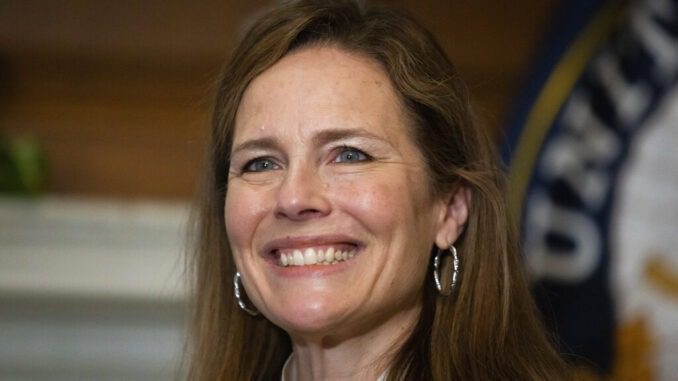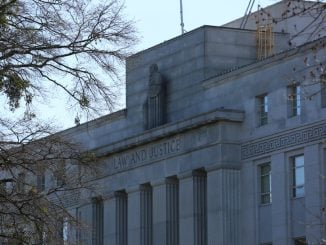
WASHINGTON, D.C. — Confirmation hearings for Supreme Court nominee Amy Coney Barrett are set to begin as a divided Senate charges ahead on President Donald Trump’s pick to replace the late Justice Ruth Bader Ginsburg before Election Day.
Barrett, a federal appeals court judge, will tell the Senate Judiciary Committee that she is “forever grateful” for Ginsburg’s trailblazing path as a woman. But she is resolved to maintain the perspective of her own mentor, the late conservative Justice Antonin Scalia and “apply the law as written,” according to her prepared opening remarks for the hearings, which start Monday as the country is in the grips of the coronavirus pandemic.
“Courts are not designed to solve every problem or right every wrong in our public life,” Barrett says in the remarks, which The Associated Press obtained.
Republicans, who control the Senate, are moving to seat Barrett before the Nov. 3 election to secure Trump’s pick and hear a high-profile challenge to the Affordable Care Act and any election-related challenges.
Democrats are trying in vain to delay the fast-track confirmation by raising fresh concerns about the safety of meeting during the pandemic after two GOP senators on the panel tested positive for the novel coronavirus.
Spokesmen for Sen. Mike Lee, R-Utah, and Sen. Thom Tillis, R-N.C., said the senators are symptom-free. Tillis will participate remotely Monday. Lee’s spokesman said the senator would be making a decision on whether to attend Monday morning, per his doctor’s orders. Both tested positive 10 days ago.
Key Democrats are staying away. California Sen. Kamala Harris, the Democratic vice presidential nominee and a committee member, plans to participate remotely from her Senate office due to coronavirus concerns, her spokesman said Sunday.
The committee released a letter from the Architect of the Capitol on Sunday that says the hearing room has been set up in consultation with the Office of Attending Physician with appropriate distance between seats and air ventilation systems that meet or exceed industry standards.
“We’re going to work safely,” said the committee’s chairman, Sen. Lindsey Graham, R-S.C., on Fox News Channel’s “Sunday Morning Futures.” He said he took a coronavirus test last week and is “negative.”
Trump chose the 48-year-old judge after the death last month of Ginsburg, a liberal icon. It’s the opportunity to entrench a conservative majority on the court for years to come with his third justice.
Outside groups are pushing Democrats to make a strong case against what they call an illegitimate confirmation, when people are already voting in some states, saying the winner of the presidency should make the pick. No Supreme Court justice has ever been confirmed so close to a presidential contest.
“The public is with them that this shouldn’t happen before the election,” said Brian Fallon, executive director of Demand Justice, which advocates against right-leaning nominees.
The country will get an extended look at Barrett over the next three days in hearings like none other during the heated election environment and the pandemic limiting public access.
Faith and family punctuate her testimony, and she said would bring “a few new perspectives” as the first mother of school-age children on the nine-member court.
Barrett says she uses her children as a test when deciding cases, asking herself how she would view the decision if one of her children were the party she was ruling against.
“Even though I would not like the result, would I understand that the decision was fairly reasoned and grounded in the law?” she says in the prepared remarks.
A Catholic, Barrett’s religious views and past leadership role in a Catholic faith community pose a challenge for Democrats as they try to probe her judicial approach to abortion, gay marriage and other social issues without veering into inappropriate questions of her faith.
Democrats already were enraged that Republicans are moving so quickly having refused to consider President Barack Obama nominee in February 2016, well before that year’s election.
Democrats have made clear that they will press Barrett on health care, abortion and other issues where her vote could push the court further to the right.
Republicans will highlight Barrett’s belief in sticking to the text of laws and the original meaning of constitutional provisions, both Scalia trademarks as well.



